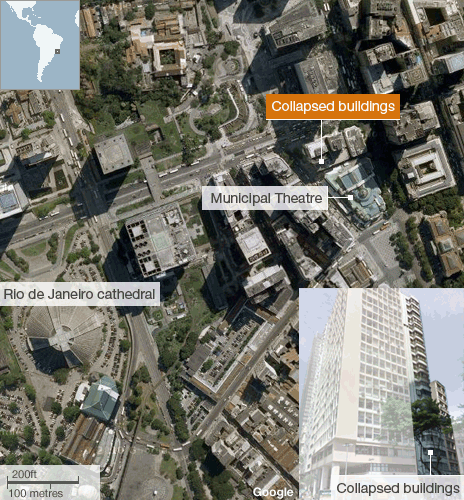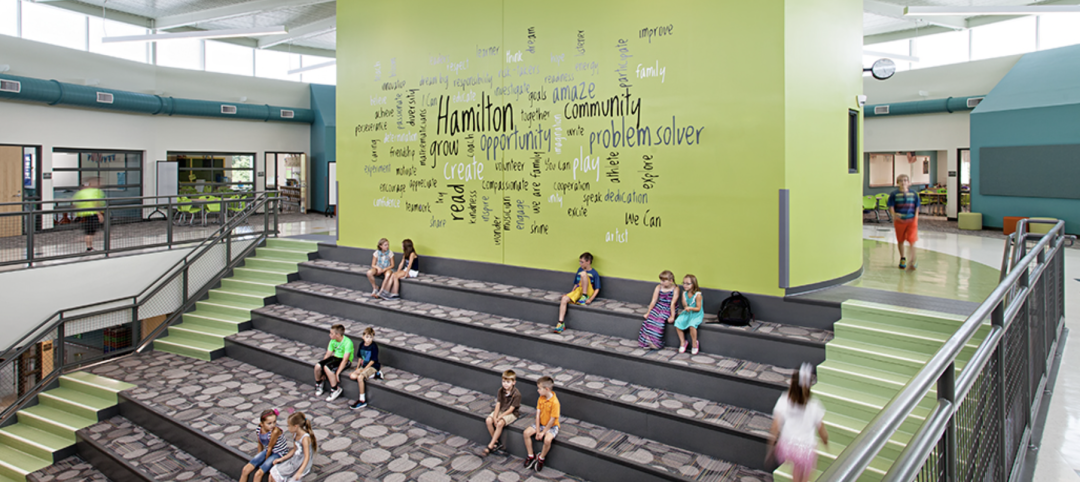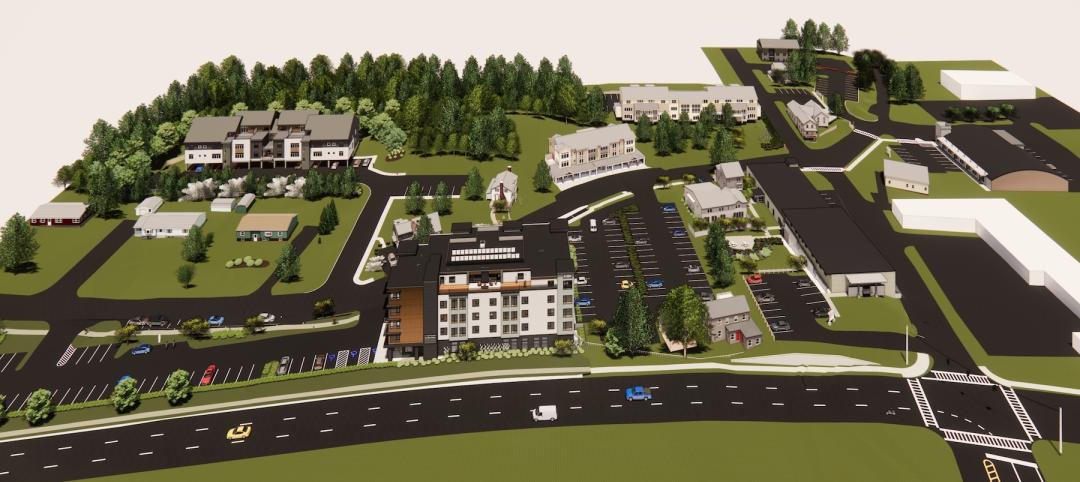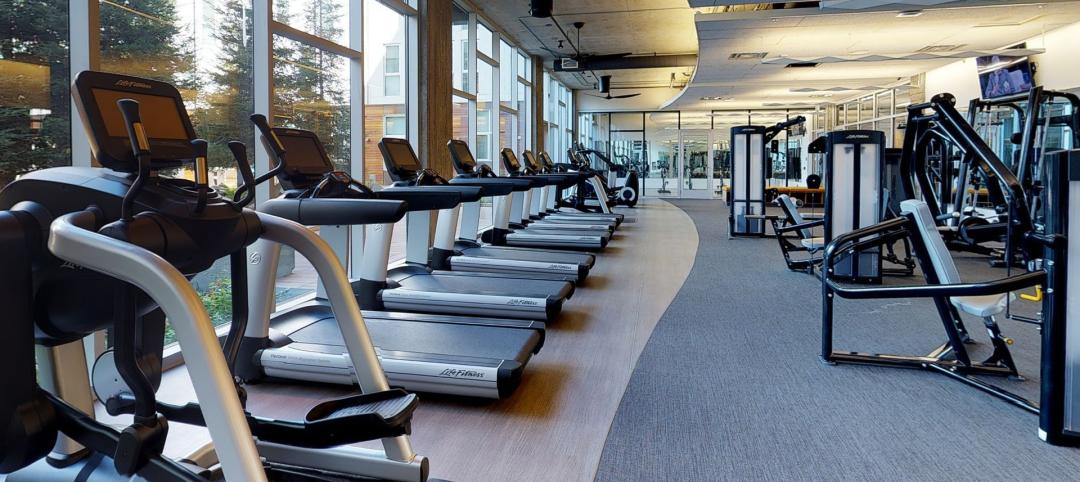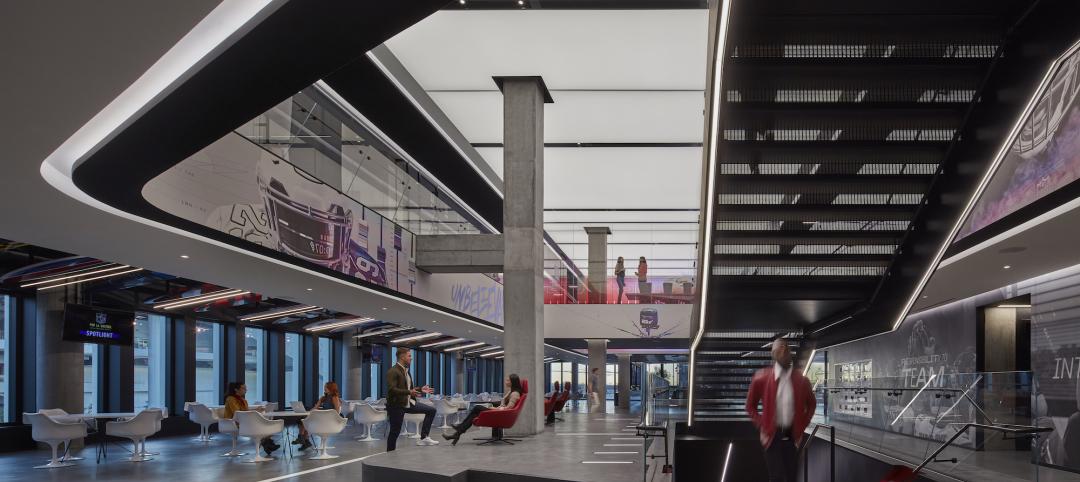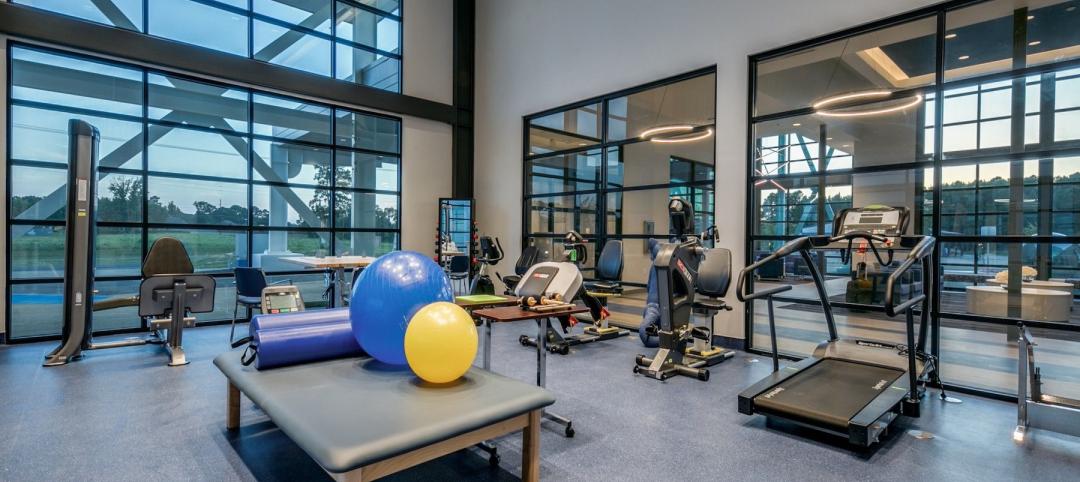RIO DE JANEIRO, Jan 26 (Reuters) - Rescuers on Thursday recovered three bodies from the rubble of three buildings that collapsed in downtown Rio, highlighting the creaky infrastructure of the city that will host the 2014 soccer World Cup and the 2016 Olympics.
The buildings, one 20 floors high, collapsed on Wednesday night in a cloud of dust and smoke just one block away from the city's historic Municipal Theater.
Rescue teams pulled six people alive from the rubble, but at least 16 people were still missing, authorities said. The buildings were mostly used for office space during the day and were almost empty at the time of the disaster.
Rio de Janeiro Mayor Eduardo Paes said the cause of the collapse could have been a structural failure caused by work being done on one of the buildings. He said there was no gas leak that could have caused an explosion.
"The work on one of the buildings could have been the cause. They could have bungled it. That's one hypothesis but it is speculation," Paes told CBN radio broadcaster. "We will investigate this fully, because it is not normal for a building to collapse," he said.
Rio is struggling to address concerns about its decrepit infrastructure, unreliable power supplies and deficient public transportation as it prepares to host global sporting events.
Construction and renovation of 12 stadiums for the soccer World Cup in 2014 is behind schedule and there is concern that Brazil's overcrowded and inefficient airports will be not able to handle masses of sports fans expected to attend the events.
The building collapses come months after an explosion apparently caused by a gas leak ripped through a restaurant in downtown Rio, killing three people and igniting more concern about the state of the city's infrastructure.
In recent months, Rio's inhabitants have had to deal with exploding sewer lines and landslides in the city's slums caused by heavy rain and deforestation.
The collapsed buildings had a bakery and an Itau Unibanco Holding bank branch on the ground floor and were near the headquarters of state-run companies such as oil giant Petrobras and development bank BNDES.
Witnesses said they heard the structures cracking and saw plaster falling before the buildings collapsed, causing panic in the streets and covering parked cars with dust and debris.
"It was like an earthquake. First some pieces of the buildings started to fall down. People started to run. And then it all fell down at once," a witness who identified himself as Gilbert told Reuters.
One man said he was on the 10th floor and ran down the stairs just in time to escape the collapse. BD+C
Related Stories
Education Facilities | Nov 30, 2022
10 ways to achieve therapeutic learning environments
Today’s school should be much more than a place to learn—it should be a nurturing setting that celebrates achievements and responds to the challenges of many different users.
75 Top Building Products | Nov 30, 2022
75 top building products for 2022
Each year, the Building Design+Construction editorial team evaluates the vast universe of new and updated products, materials, and systems for the U.S. building design and construction market. The best-of-the-best products make up our annual 75 Top Products report.
K-12 Schools | Nov 30, 2022
School districts are prioritizing federal funds for air filtration, HVAC upgrades
U.S. school districts are widely planning to use funds from last year’s American Rescue Plan (ARP) to upgrade or improve air filtration and heating/cooling systems, according to a report from the Center for Green Schools at the U.S. Green Building Council. The report, “School Facilities Funding in the Pandemic,” says air filtration and HVAC upgrades are the top facility improvement choice for the 5,004 school districts included in the analysis.
Architects | Nov 29, 2022
Three decades and counting, Tinkelman Architecture has helped reshape New York’s Hudson Valley
The full-service firm has designed more than 100 projects in this region, including several multifamily buildings currently in the works
Retail Centers | Nov 29, 2022
'Social' tenants play a vital role in the health of the retail center market
After a long Covid-induced period when the public avoided large gatherings, owners of malls and retail lifestyle centers are increasingly focused on attracting tenants that provide opportunities for socialization. Pent-up demand for experiences involving gatherings of people is fueling renovations and redesigns of large retail developments.
Giants 400 | Nov 28, 2022
Top 200 Office Sector Architecture and AE Firms for 2022
Gensler, Perkins and Will, Stantec, and HOK top the ranking of the nation's largest office sector architecture and architecture/engineering (AE) firms for 2022, as reported in Building Design+Construction's 2022 Giants 400 Report.
Legislation | Nov 23, 2022
7 ways the Inflation Reduction Act will impact the building sector
HOK’s Anica Landreneau and Stephanie Miller and Smart Surfaces Coalition’s Greg Kats reveal multiple ways the IRA will benefit the built environment.
Multifamily Housing | Nov 22, 2022
10 compelling multifamily developments debut in 2022
A smart home tech-focused apartment complex in North Phoenix, Ariz., and a factory conversion to lofts in St. Louis highlight the notable multifamily developments to debut recently.
Digital Twin | Nov 21, 2022
An inside look at the airport industry's plan to develop a digital twin guidebook
Zoë Fisher, AIA explores how design strategies are changing the way we deliver and design projects in the post-pandemic world.
Healthcare Facilities | Nov 17, 2022
Repetitive, hotel-like design gives wings to rehab hospital chain’s rapid growth
The prototype design for Everest Rehabilitation Hospitals had to be universal enough so it could be replicated to accommodate Everest’s expansion strategy.


